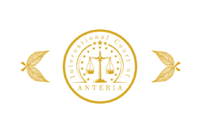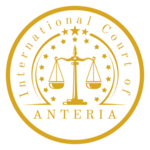The International Court
This article is incomplete because it is pending further input from participants, or it is a work-in-progress by one author. Please comment on this article's talk page to share your input, comments and questions. Note: To contribute to this article, you may need to seek help from the author(s) of this page. |
International Court | |
|---|---|
| Capital | Cartwright, Layfet |
| Type | judicial union |
| Leaders | |
• Chief Justice | Santiago M. Romero of Layfet |
| Establishment | |
• Charter of the International Court | 4 January 2015 |
Website ic.int | |
The International Court, sometimes known as the World Court, the International Court of Anteria, the Supreme Court of the World, is an international governmental organization that settles disputes between its member states in accordance with international law and gives advisory opinions on other various areas of international law. The court's decisions are only binding to its member states, however it is on its member states to collectively work together to enforce the courts decisions. The court will occasionally hear disputes on non-member states, however these decisions are only advisory and non-binding. The court will also take no action to ensure enforcement of advisory opinions. Currently, the ICA is the only international court that adjudicates general disputes between countries, with its rulings and opinions serving as primary sources of international common law.
The IC was established on January 4th, 2015. The Charter of the IC sets forth its purposes, rules, statues, format, and procedure. The IC is a bench of 7 judges elected by delegates for twenty-year terms. The International Court is headquartered in Cartwright, Layfet
History
The idea of an international institution established for the purpose of settling international disputes was proposed by Executive Minister Edmond Dantes of Layfet to the Pact of the Republics in 2008, however logistical reasons and the various limitations imposed by the Pact of the Republics's charter prevented the idea from evolving and it faded from discussion. Renewed efforts came later when Dantes brought up the idea to Sebric Federal Minister of Justice Zakāria Insbruk and Kentalian Minister of Justice Antoniya Vlasova. The three worked with committees within their governments and drafted the Charter of the International Court in late 2014. After it was ratified by the Kentalian, Sebric, and Layfetian governments, the IC was established on January 4th 2015. Anterpol and the International Bar Association were all constituted shortly thereafter on January 15th. After various talks with the Bakyern government, on February 9th, 2020, The IC created International Pre-Trail and Post-Trail Services, which was created to delegate certain services of the court. IPTPTS shortly contracted United Correctional Facility Corporation with thereafter to build the International Prison Complex, construction of which will be completed in early 2021. The ICP is owned by the United Correctional Facility Corporation but will comply with IPTPTS policy.
Selected Cases
| Name: | Case: | Date of Trail: | Charge: | Ruling/Sentence: | Notes |
| Logan J. Tours of Template:Country data Layfet | International Community v. Tours | 16 February 2016. | Terrorism (International) | Tours, the grandson of the former leader of the Template:Country data Stratocracy of Layfet had planted a bomb at the International Court. The bomb went off and killed around 24 people working at the building. The court was not in session at the time. After his arrest, he was tried in the IC under the Terrorism Clause. The Court ruled that Tours was guilty of Terrorism, concluding so after an investigation found particles relating to a bomb development site that Tours owned. The Court sentenced Tours to life in prison. He is current serving his Life-Sentence in Layfet. | Tours was the case that showed that developing international institutions needed security. As such, Layfet made efforts to increase security at all sites of international importance, including embassies. Defending these sites is now the primary duty of the Layfetian National Guard. |
| Lev Smirnov of |
International Community v. Smirnov | 7 August 2020 | Terrorism (Domestic) | Smirnov had committed a terrorist act in Kentalis which resulted in the death of 48 citizens. After his arrest, he was tried in the IC under the Terrorism Clause. The Court ruled that Smirnov was guilty of Domestic Terrorism, reasoning that the overwhelming evidence was indisputable. The Court sentenced Smirnov to life in prison. He is current serving his Life-Sentence in Kentalis. | Smirnov was the case that solidified the Court's power to hear domestic terrorism cases. As during trial Smirnov objected to the court's jurisdiction arguing that his actions were an internal Kentalis mater. The court however unanimously defended its jurisdiction, holding that "parties to the charter intended all terrorism to be subject to this court's review" because "terrorism is such a grave act that concerns the international community as a whole, regardless of how localized it may be." |
| President Ander Starget of |
Member States v. Starget | 13 October 2020 | Torture and Violation of Human Rights | Starget had tortured 600 prisoners' of war and left them with inhumane conditions. These 600 prisoners' of war where members of the royalist faction of Neferheim during the civil war. When these facts reached the Court, they asked Starget to sumbit himself to the Court for a preliminary and investigation hearing. Starget did so and the Court order a joint Template:Country data Layfet- |
Starget is notable because of two different reasons. First, it was the first instance of the use of the plea deal in the international court. Secondly, it firmly established the court's power to order investigations. Though the Court previously could call for an investigation, it was up to independent parties to complete the investigation. In this case, the court assumed the power to order an investigation to commence because "the needs of many who suffer, especially in cases of torture, outweigh the interests of sovereignty when 'time is of the essence'". |
Organization
The International Court is made up of four separate entities which include the court itself, Anterpol, International Pre-Trial and Post-Trail Services, and the International Bar Association:
| Agency | Headquarters | Purpose | Leader |
|---|---|---|---|
| International Court(IC) | Cartwright, Template:Country data Layfet | Settle disputes between its member states and decide trials of international crimes in accordance with international law and give advisory opinions on other various areas of international law. | Chief Justice Santiago M. Romero of Layfet |
| The International Criminal Police Organization (ANTERPOL) | Aresov, |
Facilitates police cooperation, investigations, and crime control between member states with regards to international crimes and international law. It also has specialized agents that have the power to arrest with relation to international crimes and law. | Director Zarya Mikelaski |
| International Pre-Trial and Post-Trail Services (IPTPTS) | Wicht, |
Administers probation, bail, supervised release, collections, pre-trial confinement, as well as prepare cases and publications, ensure compliance of decisions, and in the context of international law for the International Court. It also provides policies for the international Prison Complex (IPC) which is owned and administered by United Correctional Facility Corporation. The IPC will house international criminals upon its completion and is being constructed Near Hasfelden in western |
Director Oskar Muller of Bakyern |
| International Bar Association (IBA) | Cartwright, Template:Country data Layfet | To qualify lawyers and judges for service in international law. | Chairman Frasier Crane of Layfet |
Composition
The IC is composed of seven judges elected to twenty-year terms. The judges were nominated by IC member states and then voted on by the member state's Ambassador to the IC. The Chief Justice is chosen as being the most senior member of the court and is currently Santiago M. Romero of Layfet, being the first judge on the bench and serving since 2015. Judges of the IC are entitled to the style of Their Honor. No two judges currently serving may be nationals of the same country nor can any judge be elected more than once. The working language of the court is english.
To be a eligible judge on the bench of the IC the judge needs to have served as judge in a member state, be among persons of high moral character, hold any other political office, be able to hold impartiality, have no conflicts of interest, understand and apply international law, be of at least 30 years of age, and cannot be convicted of any felony or high crime in a member state.
Judges may deliver joint judgments or give their own separate opinions. Decisions and advisory opinions are by majority. Judges may also deliver separate dissenting opinions.
Seven Justices of the Court
| Justice | Nation | Term |
|---|---|---|
| Santiago M. Romero | Template:Country data Layfet | 2015-2035 |
| Tomas Jimæs Fijerbargen | 2015-2035 | |
| Yorik J. Nikafsha | 2016-2036 | |
| Friedrich A. Weidmann | 2020-2040 | |
| Lucía de la Armenta | 2020-2040 | |
| Mateo García Lopez | 2015-2035 | |
| Edmund Garner | 2020-2040 |
Jurisdiction
The International Court and its various agencies have full jurisdiction in all its member states, and limited "invited" jurisdiction elsewhere.
Members
| Nation | Year Joined |
|---|---|
| 2015 | |
| Template:Country data Layfet | 2015 |
| 2015 | |
| 2015 | |
| 2015 | |
| Template:Plattinum | 2015 |
| 2016 | |
| File:Halsuntrian Flag.png Halsuntria | 2019 |
| 2020 | |
| 2020 | |
| 2020 | |
| 2020 | |
| 2020 | |
| 2020 | |
| 2020 | |
| 2020 | |
| 2020 | |
| 2020 | |
| 2020 |
Observer State
| Nation | Year Joined |
|---|---|
International Crimes
In addition the IC and its agencies have jurisdictional power over the following crimes:
This article is incomplete because it is pending further input from participants, or it is a work-in-progress by one author. Please comment on this article's talk page to share your input, comments and questions. Note: To contribute to this article, you may need to seek help from the author(s) of this page. |
| Crime | Notes |
|---|---|
| Assassination | Applies only when a national of a member state murders or assassinates a national of a foreign state. That foreign national does not have to be a member of the IC. The IC does not hear matters relating to domestic assassination |
| Crimes Against Humanity | Note Needed |
| Genocide | Note Needed |
| Reckless Warfare | Applies only when a member state fails to declare war, or declares war with no valid Casus belli, when such member state is the "aggressor". |
| Reckless Employment of a Weapon of Mass Destruction | Applies only when an individual acting on their own accord, without authorization from their government, employs a weapon of mass destruction. |
| Terrorism (Domestic) | Note Needed |
| Terrorism (International) | Note Needed |
| Torture | Note Needed |
| Violations of Human Rights | This is the only crime which the Court consitutes as subjective and is charged when a majority of the justices deems it has been violated. It is usually accompanied by other crimes such as torture, genocide, and crimes against humanity. |
| Violations of the Ludahall Accords for International Conflict | See https://docs.google.com/document/d/1i0VORu9mCoO0mznahZQL5XUcTgRnEF7kG3iXURJe74U/edit . Applies only when the member state is a signatory to the Ludahall Accords and a member of the IC. |
See Also
Eternal Links

